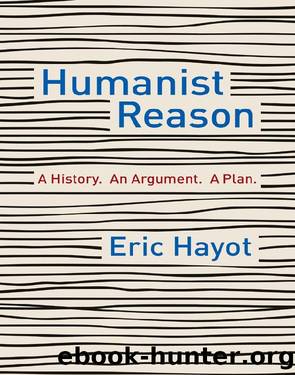Humanist Reason by Eric Hayot;

Author:Eric Hayot;
Language: eng
Format: epub
Tags: LIT006000, Literary Criticism/Semiotics & Theory, LAN005010, Language Arts & Disciplines/Writing/Academic & Scholarly
Publisher: Lightning Source Inc. (Tier 3)
Published: 2021-02-03T00:00:00+00:00
Article 4
Human Social Life Is Not Flat; Scales Are Complex, Overlapping, and Porous. âThe rise to prominence of computational analysis in literary studies in the last two decades, often under the general heading of digital humanities, has produced an extensive humanist metadiscourse around the idea of scale, as a discipline associated most prominently with the epistemo-ethically conceived practice of close reading has attempted to fight off a challenge posed to that practice on an epistemological level by the large-scale computational analysis of texts. Much of this debate, which begins around Franco Morettiâs provocative coinage of the term âdistant readingâ in 2001, falls into patterns that resemble in every way the debates between the positivist and antipositivist humanists of the German Methodenstreit: on one side the protectors of sacred objects and ethical relationality to the other, defenders of the unique and the free, and on the other the imposers of hierarchy and subordination, the erasers of human difference, the totalizers and dominators. Alongside these essentially ethical claims come a series of more explicitly epistemological ones, which amount to the computational side asserting, on the basis of its scholarly research, that the work it does tells us something interesting about literature, and the anticomputational side asserting, in response, that such analysis only confirms, albeit in a different language, stuff that everyone already knows.
As Ted Underwood has argued, the specific use of computational methods or statistical analysis seems less characteristic of these recent critical shifts than a more general move toward large-scale, syncretic approaches, one frequently accompanied by critiques of the historical dominance of close reading and of the effects of close reading on the kinds of questions one could possibly ask about literature.13 An epistemological defense of that set of ways of thinking would not have to defend (or even mention) computation at all, but rather could focus on the historical tradition of work that would include the midcentury structuralism of either the French (Claude Lévi-Strauss) or American (Talcott Parsons) type, or the kinds of thinking about literature done by Northrop Frye or Erich Auerbach, or indeed anyone who has ever made claims about the general history of the novel, or again the longue durée historicism of the Annales school, and so on. But even such a defense would have to contend with the fact that many of the forms of analysis one thinks of as involving heavy emphasis on uniqueness or particularityâclose or psychoanalytic or deconstructive reading in literary studies, microhistory or microsociology, the ethnography or the case studyâdo not simply abandon the larger scale in favor of a kind of raw description, but rather arrive at exceedingly large-scale claims through what one might think of as, recalling Kant, a form of reflecting judgment that moves from the case to the general lesson, the single poem to the philosophical insight, the cheese and the worm to the entire lifeworld of early modern Italy, all of these local variations on the great adventure that leads from the particular to the universal. What
Download
This site does not store any files on its server. We only index and link to content provided by other sites. Please contact the content providers to delete copyright contents if any and email us, we'll remove relevant links or contents immediately.
| Administration | Assessment |
| Educational Psychology | Experimental Methods |
| History | Language Experience Approach |
| Philosophy & Social Aspects | Reform & Policy |
| Research |
The Art of Coaching Workbook by Elena Aguilar(50120)
Trainspotting by Irvine Welsh(21035)
Twilight of the Idols With the Antichrist and Ecce Homo by Friedrich Nietzsche(18303)
Fangirl by Rainbow Rowell(8794)
Periodization Training for Sports by Tudor Bompa(7929)
Change Your Questions, Change Your Life by Marilee Adams(7384)
This Is How You Lose Her by Junot Diaz(6451)
Asking the Right Questions: A Guide to Critical Thinking by M. Neil Browne & Stuart M. Keeley(5360)
Grit by Angela Duckworth(5302)
Red Sparrow by Jason Matthews(5199)
Paper Towns by Green John(4805)
Room 212 by Kate Stewart(4741)
Ken Follett - World without end by Ken Follett(4449)
The Sports Rules Book by Human Kinetics(4079)
Housekeeping by Marilynne Robinson(4070)
Double Down (Diary of a Wimpy Kid Book 11) by Jeff Kinney(3933)
Papillon (English) by Henri Charrière(3913)
Exercise Technique Manual for Resistance Training by National Strength & Conditioning Association(3790)
The Motorcycle Diaries by Ernesto Che Guevara(3789)
